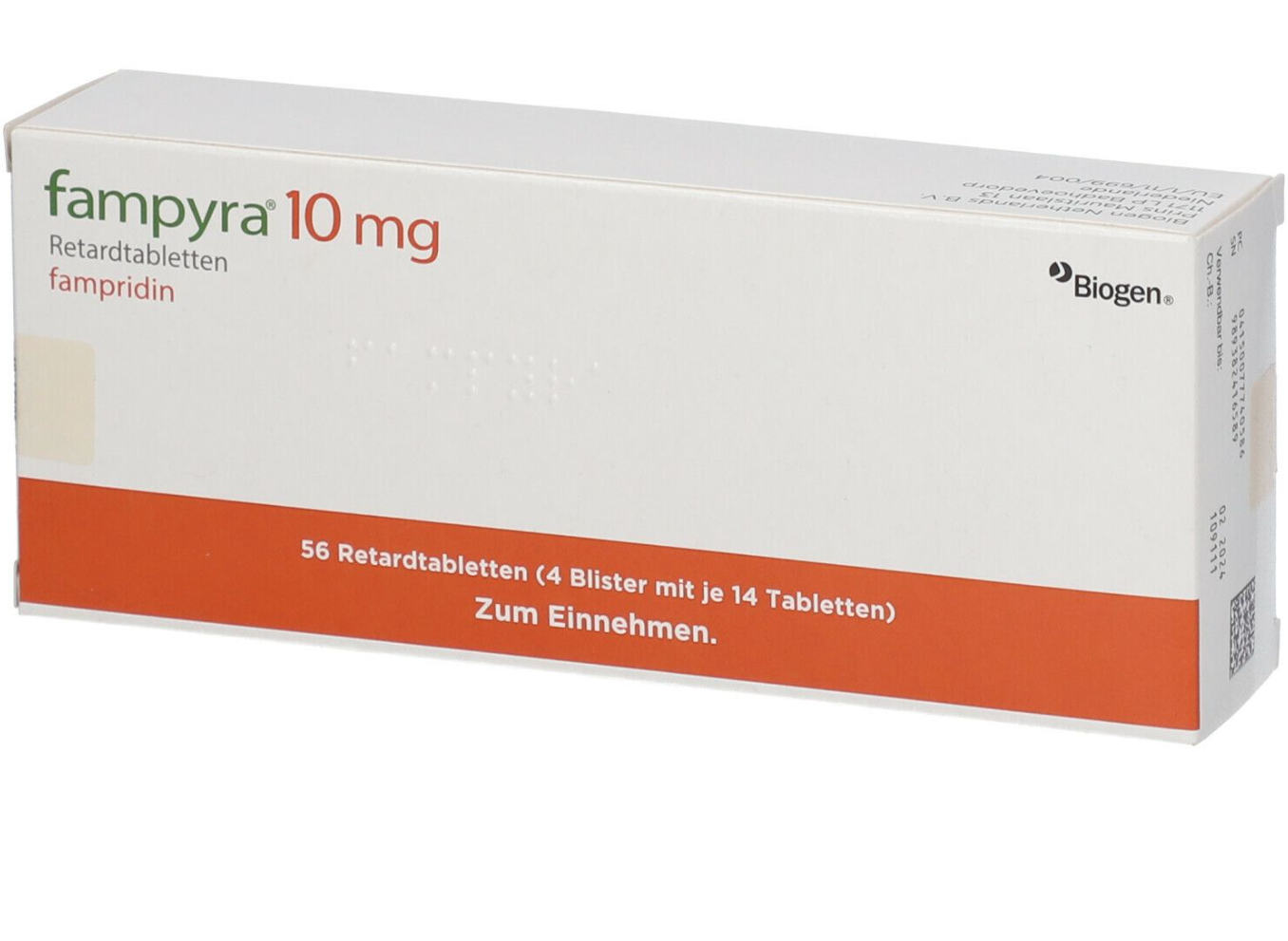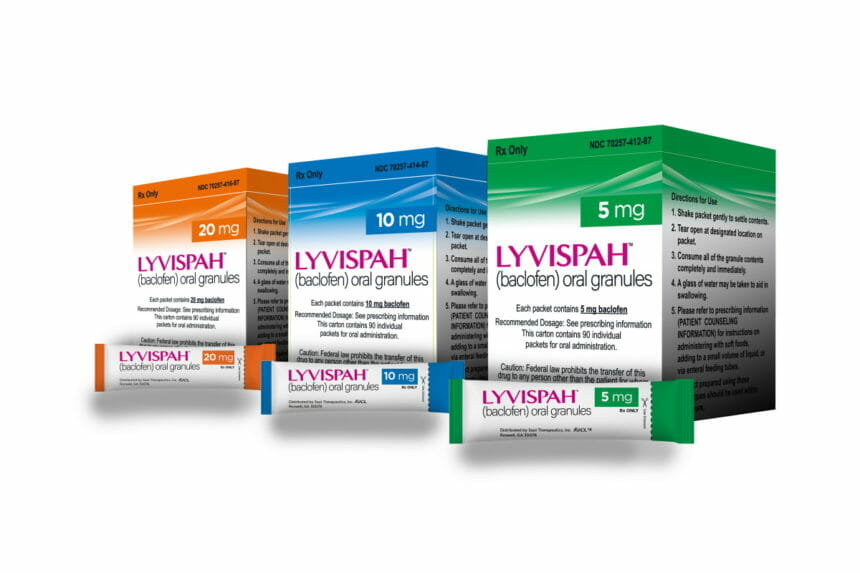Fampyra (fampridine) vs Lyvispah (baclofen)
Fampyra (fampridine) vs Lyvispah (baclofen)
Fampyra (fampridine) is primarily prescribed to improve walking in patients with multiple sclerosis (MS) by enhancing nerve signal conduction. In contrast, Lioresal/Lyvispah (baclofen) is a muscle relaxant used to alleviate spasticity in various conditions, including MS, spinal cord injuries, and cerebral palsy. When deciding between these medications, a patient should consider their primary symptom concern: Fampyra is chosen for walking improvement in MS, while baclofen is selected for muscle spasticity relief.
Difference between Fampyra and Lyvispah
| Metric | Fampyra (fampridine) | Lyvispah (baclofen) |
|---|---|---|
| Generic name | Fampridine | Baclofen |
| Indications | Improvement of walking in patients with multiple sclerosis (MS) | Treatment of spasticity from multiple sclerosis, spinal cord injuries, or other spinal cord diseases |
| Mechanism of action | Potassium channel blocker | GABA(B) receptor agonist |
| Brand names | Fampyra | Lioresal, Gablofen, Lyvispah |
| Administrative route | Oral | Oral, intrathecal |
| Side effects | Urinary tract infection, insomnia, dizziness, headache, nausea, weakness, back pain | Drowsiness, dizziness, weakness, fatigue, headache, insomnia, nausea, constipation, urinary retention |
| Contraindications | History of seizures, moderate to severe renal impairment | Hypersensitivity to baclofen, use where spasticity is utilized to sustain upright posture and balance in locomotion, or whenever spasticity is necessary to obtain increased function |
| Drug class | Potassium channel blocker | Skeletal muscle relaxant |
| Manufacturer | Biogen | Different manufacturers including Novartis, Sun Pharmaceutical Industries, and others |
Efficacy
Efficacy of Fampyra (Fampridine) in Multiple Sclerosis
Fampyra, known generically as fampridine, is a medication that has shown efficacy in improving walking in individuals with Multiple Sclerosis (MS). Fampridine is a potassium channel blocker that works by enhancing signal conduction in nerve fibers where the myelin sheath has been damaged due to MS. Clinical trials have demonstrated that patients with MS who take Fampyra can experience an increase in walking speed. The measure of efficacy is often gauged by the Timed 25-Foot Walk (T25-FW) test, where a noticeable improvement in walking speed is considered a positive outcome. However, it is important to note that not all patients with MS respond to Fampyra, and its benefits on walking do not necessarily translate to improvements in other MS-related symptoms.
Efficacy of Lyvispah (Baclofen) in Multiple Sclerosis
Lyvispah, the brand name for baclofen, is primarily used to treat spasticity, a common symptom in MS patients characterized by muscle stiffness and involuntary muscle spasms. Baclofen is a muscle relaxant that acts on the central nervous system to alleviate these symptoms. The efficacy of baclofen in the management of spasticity in MS has been well-documented through numerous studies. Patients often report a reduction in muscle stiffness, which can lead to improved mobility and a decrease in pain associated with spasticity. Baclofen's benefits in reducing spasticity can also contribute to a better quality of life for MS patients, as it may facilitate easier engagement in physical therapy and daily activities.
Comparative Efficacy in MS Management
When comparing the efficacy of Fampyra and Lyvispah, it is important to recognize that they target different symptoms of MS. Fampyra is specifically aimed at improving walking speed in MS patients, while Lyvispah is focused on the management of spasticity. The effectiveness of each medication can vary from patient to patient, and their use may be complementary in managing the multifaceted symptoms of MS. In some cases, patients may benefit from using both medications concurrently to address both walking difficulties and muscle spasticity.
Considerations and Limitations
While Fampyra and Lyvispah have demonstrated efficacy in treating specific symptoms of MS, they are not cures for the disease and may not be effective for everyone. The response to these medications can be highly individual, and healthcare providers typically monitor patients closely to assess the benefits and potential side effects. Additionally, the long-term impact of these medications on disease progression remains a subject of ongoing research. Patients considering these treatments should discuss the potential risks and benefits with their healthcare provider to determine the most appropriate management strategy for their MS symptoms.
Regulatory Agency Approvals
Fampyra
-
European Medical Agency (EMA), European Union

-
Food and Drug Administration (FDA), USA

-
Health Canada

-
Therapeutic Goods Administration (TGA), Australia

-
Medsafe (NZ)

Lyvispah
-
Food and Drug Administration (FDA), USA

Access Fampyra or Lyvispah today
If Fampyra or Lyvispah are not approved or available in your country (e.g. due to supply issues), you can access them via Everyone.org.
How it works

Make an enquiry
Choose the medicine you want to buy, answer a couple of questions, and upload your prescription to speed things up. We’ll get back to you within 24 hours.


Make an enquiry
Choose the medicine you want to buy, answer a couple of questions, and upload your prescription to speed things up. We’ll get back to you within 24 hours.


Breeze through the paperwork
We'll guide you through the required documents for importing unapproved medicine, ensuring you have all the necessary information.


Get a personalized quote
We’ll prepare a quote for you, including medicine costs and any shipping, administrative, or import fees that may apply.


Receive your medicine
Accept the quote and we’ll handle the rest - sourcing and safely delivering your medicine.

Some text on this page has been automatically generated. Speak to your physician before you start a new treatment or medication.
Let's talk
If you have any questions, call us or send us a message through WhatsApp or email:
Contact us




